
|
| home | site map | bibliographies | country | forum | links | studies | what's new | photogalleries | about us | |
|
 |
||
|
click
on image to go to enlargement - all text & images © Tony Chen |
The White Miao Dance Flower festival in Dafang dates back some 200 years. It is said that China’s top rulers wanted a prince to reign over the which caused the Miao in southwest Guizhou to revolt. The Miao refused to obey the orders given to them, resulting in two Miao leaders being beheaded. The Miao then rose up under the leadership of two heroes, Tao Erying and Tao Sanchun but were defeated because of the overwhelming number of soldiers oposing them. Since that time, the White Miao live split up in different regions such as Bijie, Nayong, Dafang, Zhijin, Anshun, the Wudang district of Guiyang city, Zhenxiong in Guizhou as well as Yunnan and elsewhere. In order to strengthen their ties with relatives whose relationships have been severed by living so far apart, to aid the Miao’s prosperity and to give their young people the chance to seek love partners, the White Miao in Dafang decided to hold an annual Dance Flower Festival on the 11th and 12th days of the second lunar month. This tradition has been passed down through the generations and has become a large and important festival for the White Miao of the region. In March and April 2007, I led a tour of four Americans to see three Miao festivals. On the day of this Miao festival, we started the tour from Guiyang, the capital city of Guizhou province. Initially we drove on an acceptable road through stunning scenery of mountains and high canyons. When we were close to the festival place, the road became pretty poor. Fortunately it was sunny, so the road was not slippery. Our car moved as sluggishly as a snake o n the craggy slopes as we drove through a field of corn where the road was full of extremely sharp stones. We were not, however, too far from the festival ground, about 1.5 km distant, so when we saw many Miao women and children walking along a short-cut to the festival ground we decided to give up driving and followed in their footsteps. As all five of us were keen photographers we could not resist getting out our cameras and taking pictures. When we arrived at the festival ground, some people had already started to leave to return to their homes because they had a long distance to travel. However, some were just arriving, so we were still able to see a lot of people. The festival was held on a slope surrounded, at its base, by cornfields. The unmarried Miao girls in fine embroidered, woven costume, with batik pleated skirts, danced around a so called “flower tree”. In fact, it was not a flower tree but a newly felled tree inserted into the chosen slope. Some fresh leaves remained on the tree. The boys led the dance playing lusheng (a kind of bamboo flute musical instrument). Some old men played suona (a wooden, double reeded, oboe-like instrument with a brass bell) whilst the boys and girls sang love songs to each other. Children were busy buying and eating candies and sugar cane. Some vendors were selling local specialties. The old men and women offered their home-made corn wine to each other if they were relatives. Everyone’s face was full of happiness and it seemed as if it was a sea of songs and a world of flowers - the Miao girls’ costumes and the real peach blossoms. A complicated feeling was rising from the bottom of my heart. I was sad because I knew that they were so poor but at the same time I was happy because of their smiling faces and hospitableness. Most importantly I am Miao too and we had the same forefather several thousands of years ago, although we now live in different regions. I ran to take pictures. On the top of the slope I met a group of men who looked a little drunk but hospitable. Some were playing suona and some were beating their hide drum. I could not resist taking a few photos and showed them to the men. They seemed happy to see the pictures and were satisfied with them. They then started to play the suona and beat the hide drum more loudly. I think that they were pleased that I enjoyed their music. When I came down to the lower slope, two pretty Miao girls in gorgeous festival dress caught my eye and I saw one of them trying to talk to Joanne, who was one of the members of my group. As I went towards them, I noted the taller girl. She looked very happy and proud to talk to us. She said she was now a college student at Guizhou University majoring in art and she had come back home especially to join in this festival, because it was so important for her, for her parents and for her relatives. She asked ‘was I from that village’, pointing in the direction of a Miao village on the other side of the mountain which looked peaceful and very faraway. When I said that I was a Miao from Leishan and also graduated from Guizhou University, she looked very happy. She even tried to speak English to us. She invited us to visit her home but unfortunately we did no t go there because we did no t have time as we soon had to leave for Bijie and it would have taken us two hours to get to her village on foot. The girl also told us that, so far, she was the first and only college student from this region, inhabited by the White Miao. More and more people started to surround us and I noticed that lots of young boys had great admiration for her because she was a college student. This was the best dream of their parents for generations and it was unbelievable if they could go to college. She introduced the other girl to us saying “This is my cousin, she now is studying at Grade 3 in the No.1 Senior Middle School of Dafang. She is also a strong student so maybe she can go to university too.” We could not help saying “congratulations!” Finally we had to say goodbye to them. A feeling rose from the bottom of my heart and I wanted to wish her a bright future. When we were close to the main road, a young man showed a piece of paper to us - Charlis, Joanne, Linda and I. We learnt that the remaining member of our group, Arvona, had found something interesting at the young man’s home and she wanted us to go there with him. Several dogs began to bark when we were close to his house. We were invited to go inside. Arvona was trying to use all her body language to communicate with the Miao women. She seemed to be interested in a Miao woman’s textiles and she needed my help. The small room was crowded because they had never seen foreigners before and everyone was surprised by the group members’ hair, size and height. Charlis was nearly two meters tall. However, I think that they were more curious about why we liked their textiles. Arvona, Linda and Joanne had each selected a batik pleated skirt from a little woman who appeared to be a small adult and seemed to be proud of her craftsmanship. In fact she was a dwarf. Several middle-aged women tried to tell me “your clients did a good job, you got the best skirts” because this woman’s workmanship was the best in the village. I think we were lucky, but my culture is lucky too, because the Miao’s art technique is still practiced by Miao women, whether they are old or young, healthy or disabled. Maybe that is why they inherit their skills so well due to their innate sense of beauty. I had to leave the village and festival ground because I had more surprises to encounter on an other day. I prayed that they would have not only a better spiritual life but also a better material one. This article has been submitted by Tony Chen Hualong, a Miao from Langde village in Guizhou province, China. See his website www.alongdiscovery.com. Contact Tony. See his articles on the Miao in Guizhou.
|
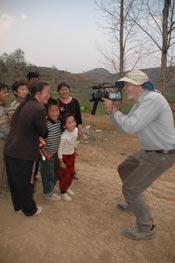 |
|
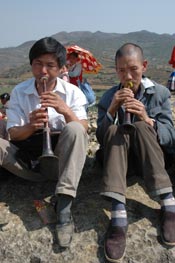 |
||
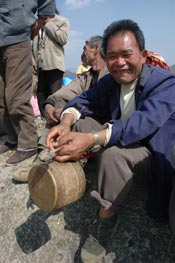 |
||
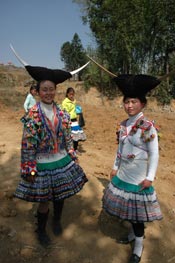 |
||
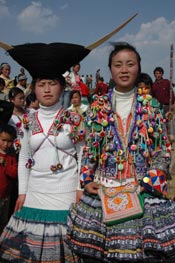 |
|
| home
|
site map | bibliographies
| country | forum |
links | studies
|
what's new
| photogalleries | about
us | |
|
Copyright © 2012 Pamela A Cross. The contents of this site, including all images and text, are for personal, educational, non-commercial use only and may not be reproduced in any form without the express permission of Pamela A Cross. |
|
If
you have any comments
on the tribaltextiles.info website please send them to us. If you have
any general tribal textile comments or questions go to the tribaltextiles.info/community
forum to share your thoughts and questions with an international
community of enthusiasts. |
this
page last updated
20 February, 2012
|